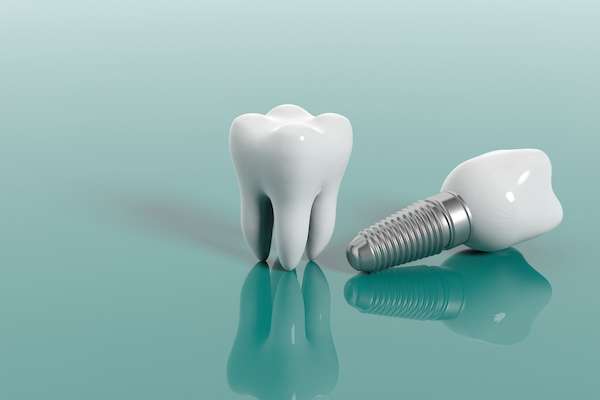 Dental implants are often used to replace individual teeth but can also offer multiple teeth replacement options. Such options include cantilever bridges, implant-supported bridges and implant-supported partials.
Dental implants are often used to replace individual teeth but can also offer multiple teeth replacement options. Such options include cantilever bridges, implant-supported bridges and implant-supported partials.
Dental implant options for patients missing multiple teeth
Depending upon the condition of the person's gums and jawbone, a single implant can sometimes be placed to support two adjacent teeth. More commonly, multiple implants are used to anchor fixed bridges or removable partials.
Cantilever bridge
If a patient needs to replace two adjacent teeth, it is sometimes possible to use one implant with an additional tooth suspended to it. If the teeth are not adjacent, then two implants need to be used.
Implant-supported bridges
An implant-supported bridge can be used to replace two or more teeth on the same arch. This process involves placing multiple implants to serve as supports for the bridge. Implant-supported bridges have a number of advantages over traditional fixed bridges:
- Many patients find them more comfortable, stable and durable, with no gum irritation.
- Patients with insufficient jawbone to support individual implants can use them.
- Support from adjacent natural teeth is not needed.
- The implants act like teeth roots so the jawbone is better preserved.
- Because less deterioration occurs, implant-supported bridges maintain function and appearance for a longer time.
- The bridges do not have to be removed for cleaning or sleep.
- No adhesive is required.
Implant-supported partials
Implant-supported partials function similarly to bridges but are removable rather than being fixed in place. People who are transitioning from traditional partial dentures may find implant-supported partials an easier adjustment than a fixed bridge. This can also be a good option for patients who grind their teeth at night because they can remove the partial, protecting it from potential damage. They are effective multiple teeth replacement options for people who have difficulty brushing and flossing the teeth because the partial can be removed and cleaned outside of the mouth.
The dental implant process
Receiving dental implants is a multistage process that begins with an examination to determine whether the dental implant procedure is right for the patient's needs. The next step is to replace, remove or repair any damaged dental structures. The dentist then uses 3D digital X-rays and dental impressions to create a treatment plan and sends it to a lab to create the prosthetics.
Next, one or more dental implants are inserted below the gum line. Over the next two to six months, osseointegration occurs, which fuses the jawbone to the implants, providing sufficient support for the bridge or partial. Finally, the patient returns to have the bridge or partial placed.
Check out what others are saying about our dental services on Yelp: Dental Services in Roswell, GA.
Conclusion
Multiple teeth replacement options in the past focused on fixed bridges and partial dentures supported by the patient's natural teeth. Modern dental implants offer an alternative for patients who lack the natural teeth to support traditional bridges or who prefer the advantages offered by implants. Patients can choose between single implants, implant-supported bridges and implant-supported partials based upon their preferences and dental needs.
Request an appointment or call Roswell Dental Smiles at 770-238-1209 for an appointment in our Roswell office.
Recent Posts
A smile makeover provides a way for people to improve their confidence level and the appearance of their smile through a personalized treatment plan that consists of multiple cosmetic dental procedures. However, maintaining the results of a smile makeover involves keeping a consistent oral hygiene regimen. Read on to find out more.You can protect your…
A smile makeover is a series of cosmetic dental treatments performed primarily to address cosmetic issues affecting your teeth. It is a unique experience for each patient since treatments are selected based on their individual needs. While the main purpose of a smile makeover is to improve the way your smile looks, many of the…
Advancements in orthodontics make it possible to achieve a straighter smile without the noticeable appearance of traditional metal braces. Clear braces provide an option that blends in with natural teeth, offering a more subtle approach to orthodontic treatment. Their translucent or tooth-colored materials allow individuals to correct alignment issues while maintaining a simple aesthetic.Clear braces…


